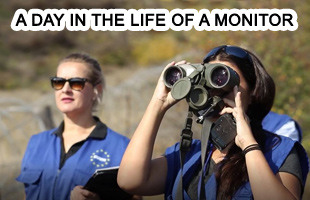1. Could you please describe your current position in the Mission, and the areas of work that you focus on?
I am the Head of the biggest Field
Office of the EU Monitoring Mission in Georgia, Field Office Gori, since 01
July 2018. In this position, I lead a team of around 95 local and international
staff deployed from around 21 EU Member States. They come from different backgrounds--civilian,
police, military—and often are deployed for one or two years, which means that
we constantly operate with a high staff turnover.
The Office is structured
around several monitoring teams in charge of patrolling on the ground, 365 days
a year, 24/7. We also have an Operations component that is responsible for this
complex planning,
a Reporting Section
that collects all the data gathered from the field, and administrative staff
who support us closely in our daily activities.
My main role is to lead,
direct and manage the work and staff of the Field Office, to ensure that all
these units and components work together to effectively deliver on the
implementation of the Mission Mandate
2. Before becoming Head of a Field Office Gori, you joined EUMM as a monitor. Could you tell us more about your start in the Mission?
To be honest, when I joined
the Mission as a monitor 10 years ago, I did not know what to expect! I come
from a civilian background, I was working in a completely different field, and
I had to adjust and learn how to work in an international environment. I also
went from working in heels as an adviser in a national agency to being in the
field every day, in boots and in the mud!
I had to learn so many things from scratch: how to use a radio, how to drive off-road, how to orientate myself with maps and GPS, etc. I had to challenge myself and prove that I, a civilian woman, could do all of this in a CSDP environment. With time, I gained skills, knowledge, and confidence. And I moved on to other positions within the Mission. I’m so grateful for this experience. Coming from the field makes me a better Head of Field Office, because I know first-hand the work that most of my staff is doing on a daily basis.
3. What have been the biggest challenges that you have faced in your career?
It is not easy to be a civilian woman manager in a CSDP environment with a majority of supervisees having a police or military background. You have to constantly prove that you possess a huge amount of knowledge, that you are strong, that you can quickly take good decisions and to demonstrate solid leadership skills so that the teams can trust and follow you.
In my career evolution with EUMM Georgia, I always strived to know my area of responsibility better than anyone else; I demanded from myself more than I requested from the others, which I continue to do. I’ve been in this role for more than 3 years now, but because of our high turn-over, I had to continuously prove myself to parts of our new staff.
A few things truly helped me. First, it is important for me to have an inclusive decision-making process: I ask my teams for their opinion, I listen, and then I take a decision. Second, I’m not afraid to take a decision and to stand-by it. Third, I’m also not afraid to recognise that I made a mistake when that happens, or to say ‘I don’t know but I’ll get back to you on this asap’. Fourthly, I openly seek feedback from my managers but also from the colleagues I supervise. And, finally, I do my best to lead by example and to continuously improve my skills as a manager.
4. What is your greatest strength? And what advice would you give to young women who want to pursue a career in civilian crisis management?
I would say that my greatest strength is my perseverance, the fact that, if I fail today, I’ll try again and do better tomorrow. This clearly helped me when I joined the Mission; I never gave up. And this is what I would say to young women, this is what I say to women I formally or informally mentor: “do your best and never doubt that, if you work hard and don’t give up, you can be successful”.
5. What has been the most rewarding or memorable experience for you personally in the Mission so far?
We work a lot, there is a
high operational tempo in the Field Office, and I had to overcome several
challenges—as previously mentioned—when I first joined the Mission, or later when
I established myself as Head of the Field Office. But it is all worth it. The
result of our efforts is truly rewarding when we see the positive outcome that
we have on peace and stability in the region and for the communities with whom
we work; when we see kids come and greet us on patrols after we have organised
some activities with them; when we see that we, in fact, help people have a
better life.
It’s important for me that we
engage a lot, in our monitoring work but also in our outreach activities, with
conflict-affected women and children living along the Administrative Boundary
Line or in shelters and collective centres for displaced persons. Several of my
fondest memories are directly connected to such activities, for instance for
the 16 Days of Activism Against Gender-Based Violence, Children’s Day, or
International Women’s Day campaigns.
6.
What needs to
change in the next 5 to 10 years?
It is important
that we increase the awareness on gender-responsive leadership, that we explain
to leaders what this means, which forms it takes, and what are its benefits. It
will also be crucial for EU institutions and Member States alike to attract and
support more women to apply for CSDP missions.


